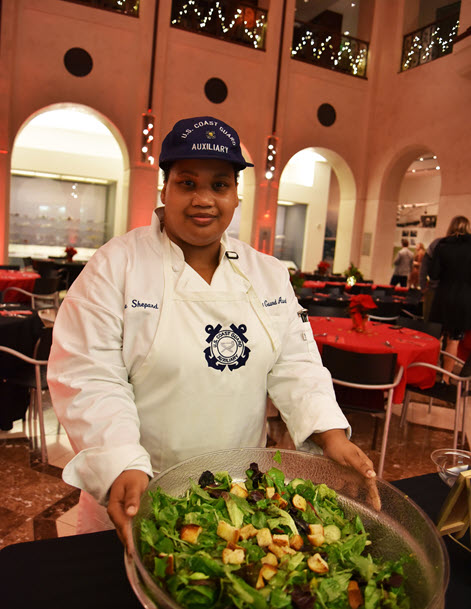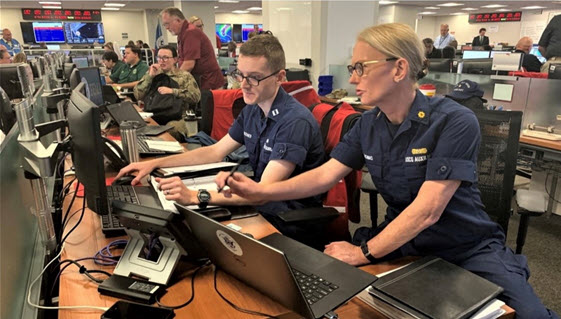| TOP | Archives |
|
SUBSCRIBE: Atom RSS What’s This? |
Our Auxiliary is a diverse organization. Its members serve the U.S. Coast Guard in multiple areas, contributing variety to our missions, training, and qualifications. We are qualified in Vessel Safety Checks, boating safety course instruction, boat crew support, and operational augmentation. Additionally, we have developed skills addressing non-traditional mission areas such as interpreter, health services support, chaplain services and the Auxiliary Culinary Assistance missions.
Expansion of these skills has greatly led to our capacity to augment the Coast Guard ashore, afloat on various cutters around the world, and deployments for duty in foreign countries with vastly different cultures and spiritual practices. These expanded mission areas have resulted in a need for multilingual members with experience growing up, living in, and working in countries where the customs are vastly different from American culture.
The Auxiliary has become a more diverse group of volunteers that serve the Coast Guard in its ever-expanding missions and need for qualified people of various backgrounds. These new mission opportunities are supported by Auxiliary members regardless of age, gender, ethnicity, religion, and sexual orientation. This has been the result of our recruitment efforts, which encourages everyone to share in our passion to serve.
For The Auxiliary to continue thriving and serving the Coast Guard in expanded mission opportunities, the Auxiliary needs to continually focus on our organization as one group with a common set of goals and values while serving the Coast Guard regardless of our biases outside the organization at all levels. Currently, successful enterprises embrace this philosophy in the workplace to attract and retain talented people of all races, ethnicities, and transgender/sexual orientations in their organizations.
We need to value the concepts of diversity and inclusion to create an environment where everyone is encouraged to expand their qualifications without prejudice or judgment in order to grow our membership and missions to assist the Coast Guard.
This concept may be new for some long-term members to embrace, but everyone in the Auxiliary deserves to be treated with dignity, kindness, respect, and without judgment, regardless of our personal beliefs. How will those in the Auxiliary Chain of Leadership and Management address the issue of re-thinking our organizational culture to recruit younger people from diverse backgrounds and retain them in the organization?
Encouraging the retention and recruitment of a more inclusive and diverse membership within the Auxiliary requires a shift in our ethos and culture. The different ethnicities, spirituality, and cultures of people today are not the same as they were decades ago. Who we are as members is an ever-evolving mantra and what members are looking to gain from service within the Auxiliary is as diverse as its membership. The emphasis on being virtually connected in the workplace and in our personal life is more complex and multi-layered as it now includes the numerous social and news information available for consumption on the numerous media outlets. Our country’s demographics have changed. And the acceptance and inclusion of people from diverse cultures, religions, and sexual orientations have also changed.
This reality presents real challenges to members in their service to the Auxiliary. What do you think would be the reaction if an Auxiliarist moderating a meeting or training at DTRAIN asked members to write on their name cards provided at check-in, their offices held as well as preferred pronouns (she/her, they/them, he/him) regardless of whether it reflected their sexual orientation or gender at birth?
What would you do if you were in a group where the majority assumed that everyone identified with their gender at birth and was making disparaging remarks about transgendered and LBGTQ individuals? Would you let them know you were uncomfortable at the time, or would you wait to talk with each person present when you were alone with the various individuals? Would you let the remarks slide? These are questions to keep in mind when we think about our contemporary missions towards diversity and inclusion.
The Auxiliary must recognize and embrace these differences. They need to become part of our ethos and values in our efforts to expand our diversity and inclusion mission. We are stronger when we recognize that our diversity is a major part of what makes us Semper Paratus – Always Ready.
By Michael Neuman, Flotilla 091-18-11
###

A Culinary Specialist Auxiliarist showcases her salad bowl during an event. Photo by Roger Bazeley, AUXPA1.

From left: LT Christopher Bodner, (CG-MER CGHQ) and Auxiliarist Renee Thomas were assigned as ESF-10 Technical Specialists & Liaison Officers to FEMA’s National Response Coordination Center (NRCC) for Hurricane Dorian. Photo provided by Auxiliarist Renee Thomas.